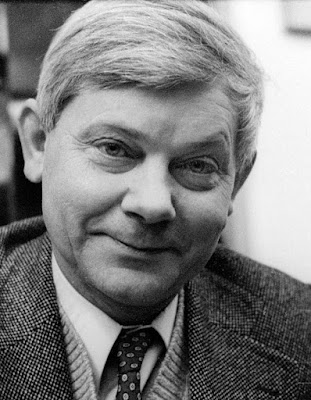When Czeslaw Milosz received his Nobel Prize for literature in 1980, some people asked this question. Why indeed? Isn't Herbert a better poet after all?
Zbigniew Herbert was a poet who didn't want to cooperate with communists and in 1950s, when many poets wrote poems praising socialism because they wanted to be published, Herbert refused and only circulated his poems among friends. Only after the liberalisation of 1956 his poems were published. There were more poets who made their début in that year, they were called "Generation 56" and Herbert was considered the best of them. He was discovered by Czeslaw Milosz, who was also a poet and who at the time was teaching at the University of Berkeley in California. Milosz translated Herbert's poems and published them in America. Some say Milosz only became known because of his translations of Herbert's poems. Others clearly have a different opinion as it was Milosz who in the end received the Nobel Prize.
The two poets were for some time very friendly but later Herbert started attacking everyone who had any involvement with the communist regime. That included Czeslaw Milosz, who for a brief period after the war worked for the Polish embassy in Paris. Later Milosz became known as the author of books like "The Captive Mind", which analyses writers seduced by communism, but for Herbert this was clearly not enough.
The best known poems of Herbert are those in the cycle of Mr. Cogito, published in 1970s, but for some people (me included) his earlier poems have more charm, which their magical rhythm only amplifies. Here are three poems written in English on inspiration by Zbigniew Herbert.
TAMARISK
I was telling about battles
battlements and warships
the slaughtered heroes
the sloughtering heroes
but I forgot about this one
I was telling about a sea storm
about walls crumbling down
about cornfields aflame
hills toppled over
but I forgot about the tamarisk
when he lies
pierced by a lance
and the mouth of his wound
closes
he does not see
either the sea
or the town
or the friend
he sees
just next to his face
a tamarisk
he climbs
onto the highest
dry twig of the tamarisk
and going around
brown and green leaves
he tries
to fly to heaven
without wings
without blood
without thoughts
without...
THE PRIEST
The priest whose deity
descended to earth
in a broken up temple
showed the human face
the helples priest
who raising his arms
knows that it won't bring rain or locust
neither good harvest nor hailstorm
- I repeat the same verse
with the same intonation
of awe
the neck ready for martyrdom
is struck by a flat hand of a mocker
my holy dance before the altar
is only seen by a shadow
that moves like a street urchin
- nevertheless
I raise my arms and eyes
I raise my song
and I know that the incense of my offering
that drills into a cold sky
plaits a plait to a deity
who has no head
REPORT FROM HEAVEN
In heaven the work week is 30 hours long
The wages are higher, prices always go down
The physical work doesn't make you feel tired (because the gravitational force is not so strong)
Chopping wood is just like typewriting
The social order is stable and the government wise
Really the life in heaven is better than in any other country.
In the beginning it was supposed to be different -
The circles of light, choirs and degrees of abstraction.
However, the separation of the soul from the body
Was not entirely successful and the soul was arriving here
With a drop of fat attached, or a thread of muscle.
Conclusions had to be drawn
A grain of the absolute was mixed with a grain of clay.
One more deviation from the doctrine; it will be the last.
Only John foresaw this – you'll be resurrected in body.
Only a few see God.
He is only for those of pure pneuma.
The rest listens to official messages about miracles and floods.
In time all will see God,
Although nobody knows when this is going to happen.
So far on Saturday at noon
The sirens sound sweetly
And the heavenly proletariat leave their factories
Clumsily carrying their wings under their arm, like violins.
If you would like to read these poems (and some more) on paper,
You can get a printout of my book "POLISH INSPIRATIONS"


No comments:
Post a Comment